外研版必修3 Module 2 Developing and Developed Countries Listening and vocabulary 课件(33张PPT无音频)
文档属性
| 名称 | 外研版必修3 Module 2 Developing and Developed Countries Listening and vocabulary 课件(33张PPT无音频) | 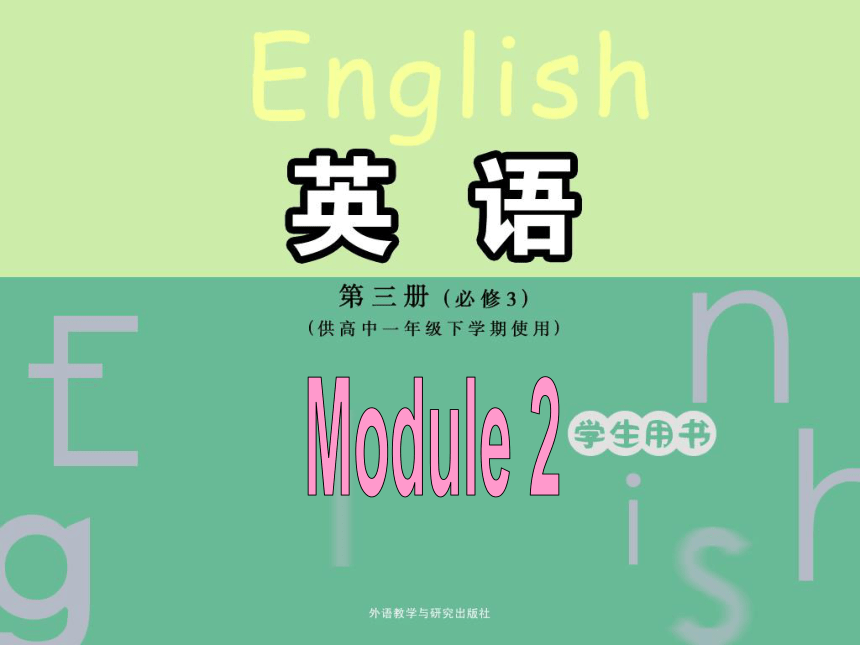 | |
| 格式 | zip | ||
| 文件大小 | 3.6MB | ||
| 资源类型 | 教案 | ||
| 版本资源 | 外研版 | ||
| 科目 | 英语 | ||
| 更新时间 | 2020-05-15 15:36:32 | ||
图片预览

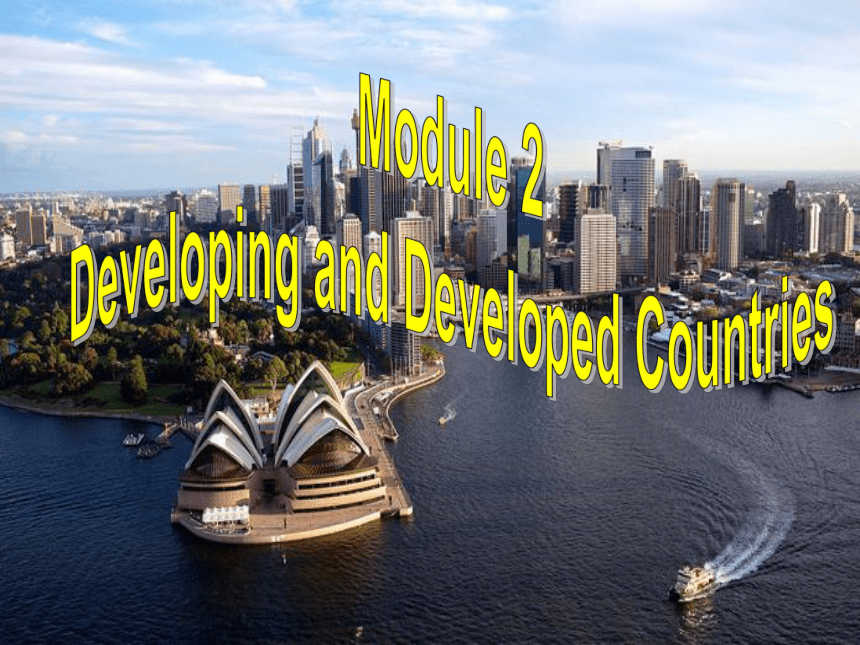

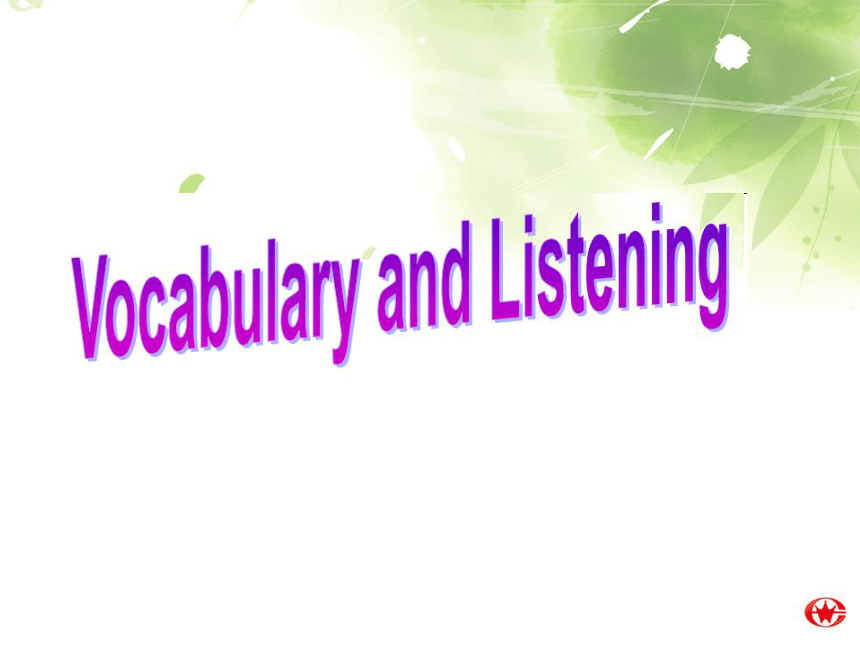

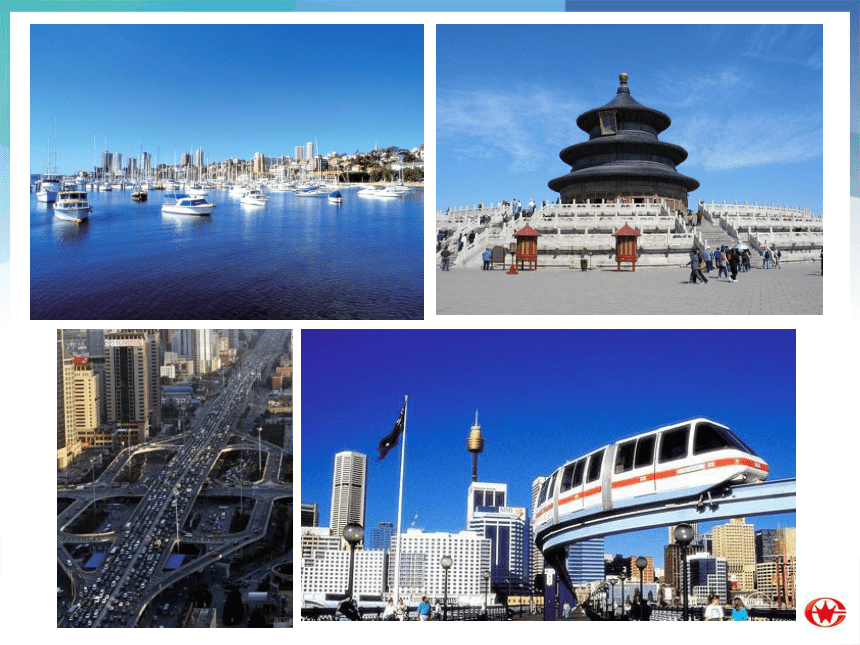


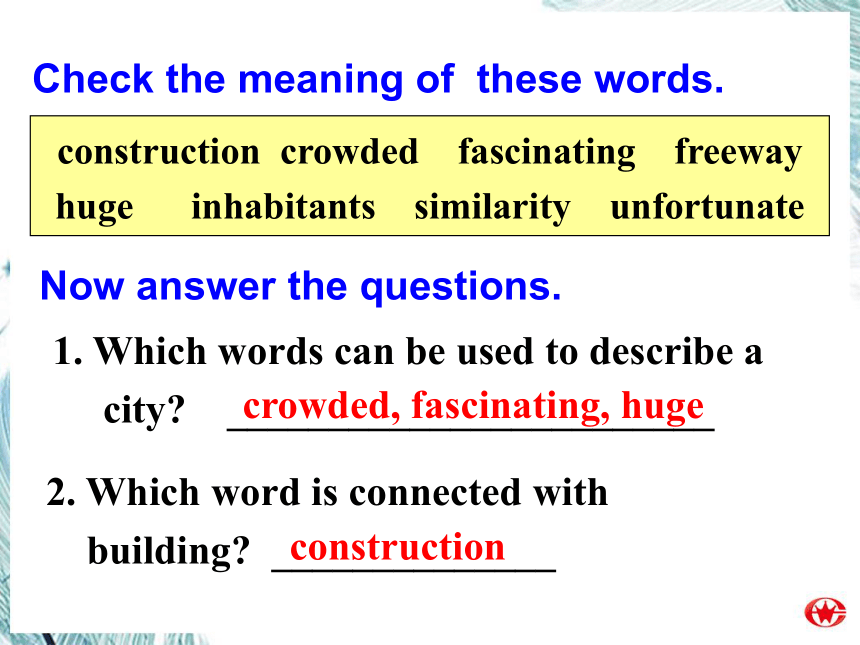

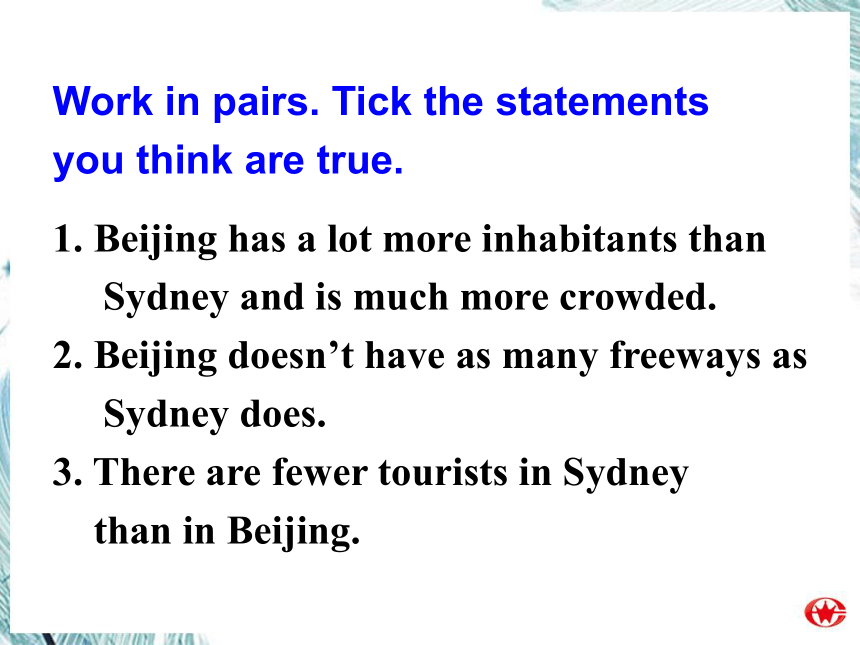

文档简介
(共33张PPT)
1. To know about the function of making comparisons
2. Learn and master the use of comparisons and have the ability to express some topic using what they have learned
3. To learn how to express their ideas and make notes about two cities
Sydney Opera House
National Grand
Theatre
What do you know about Beijing and Sydney?
Check the meaning of these words.
construction crowded fascinating freeway
huge inhabitants similarity unfortunate
2. Which word is connected with
building? ______________
Now answer the questions.
1. Which words can be used to describe a city? ________________________
crowded, fascinating, huge
construction
3. Which word means the opposite of
difference? __________
similarity
construction crowded fascinating freeway
huge inhabitants similarity unfortunate
4. Which word do we use to say that something is sad? ____________
5. Which word describes the people
who live in a particular place? __________
6. Which word means a wide road on
which cars can travel fast? ________
unfortunate
inhabitants
freeway
freeway
1. Beijing has a lot more inhabitants than Sydney and is much more crowded.
2. Beijing doesn’t have as many freeways as Sydney does.
3. There are fewer tourists in Sydney
than in Beijing.
Work in pairs. Tick the statements you think are true.
4. Beijing is less dangerous than Sydney.
5. Beijing has less rain than Sydney.
6. Beijing doesn’t have as much pollution as Sydney.
7. There are as many rich people in
Beijing as in Sydney.
8. Beijing is as lively as Sydney.
Listen to the conversation and circle the topics you hear.
climate industry location
pollution population safety
tourism transport wealth
Now listen to the conversation to check your guesses.
1, 2, 4, 7, 8
Listen to the conversation and complete the blanks.
L: Is this your __________ time in Beijing, Richard?
R: Yes, it is.
L: __________ do you find it?
R: It’s __________ fascinating. It’s so different
from Sydney, __________ I live.
L: Now I’m fascinated. Tell me about the
__________, as you see them.
first
How
totally
where
differences
R: Well, Sydney’s a __________ city than Beijing. Beijing has a lot more inhabitants and is much more __________.
younger
crowded
L: Yes, we certainly have a __________ population, like most Chinese cities.
R: It’s very __________, as a result. And there’s so much construction __________.
huge
exciting
going on
L: I know, we’re growing very fast. For example, I don’t think we have as many __________ as Sydney does, but we soon will.
freeways
R: I believe you! I think there are fewer ________ in Beijing – at least for now. And I get the feeling that Beijing’s less __________.
L: Yes, there’s probably a lot less __________ here.
tourists
dangerous
crime
R: What about the __________? I think Sydney has less rain.
L: Yes, we can get a lot of rain _________________.
R: I’ve noticed! It’s __________ at the moment!
climate
in July and August
pouring
L: The good thing about the rain, of course, is that it washes the __________ away.
pollution
R: I’ve noticed that too. We don’t have as much pollution as you do.
L: That’s because you have less __________. The air can get quite polluted here … Ok, so that covers a lot of the differences. But are there any ____________?
industry
similarities
R: Oh yes … for example, I notice the _______ and the energy.
L: Sorry, I didn’t get that.
R: The wealth and energy. I think there are as
many rich people here as in Sydney … and I think your city is just as __________ as mine.
L: That’s good to hear. So shall we go out this
evening and find some of the __________?
wealth
lively
action
1. How do you find it? means _____.
A. What is your opinion about it?
B. How did you get here?
2. It’s totally fascinating means ______.
A. It’s very, very interesting
B. It’s very, very important
Choose the correct answer.
A
A
3. as you see means ______.
A. while you see them
B. in your opinion
4. I didn’t get that means _____.
A. I didn’t take that
B. I didn’t hear what you said
5. find some of the action means ____.
A. Let’s do something interesting
B. Let’s act
B
B
A
A: I visited Great Wall yesterday.
B: Really? __________________
A: ___________________ I enjoyed it very much.
B: Can you describe it, ___________?
Fill in the blanks.
How do you find it?
It’s totally fascinating.
as you see it
A: Well, I can’t imagine how can they build it hundreds of years ago?
B: Sorry, _____________.
A: I mean it is incredible. The Great Wall can be built hundreds of years ago.
B: Yes, it’s really great.
I don’t get it
Look at these sentences from Vocabulary and listening activity 2. Answer the questions.
a … Beijing has a lot more inhabitants
( than Sydney) and is much more
crowded.
b … I don’t think we have as many
freeways as Sydney does.
c … there are fewer tourists in Beijing
(than in Sydney).
d … (Beijing) is less dangerous (than
Sydney).
e … I think Sydney has less rain (than
Beijing).
f … (Sydney doesn’t ) have as much
pollution as (Beijing).
much many fewer less
1 Which words do we use with countable nouns?
2 Which words do we use with uncountable nouns?
much
many
fewer
less
countable
nouns
uncountable
nouns
1. Is Hong Kong less / fewer crowed than Beijing?
2. Beijing doesn’t have as many /much high-rise building as Hong Kong.
3. Beijing has a lot / much more inhabitants than Hong Kong.
Choose the correct word.
4. Hong Kong has less / fewer industry than Beijing.
5. Beijing doesn’t have as much / many tourism as Hong Kong.
There are _______ poor countries in Europe than in Africa.
There are not as ______ rich countries in Africa as in Europe.
fewer
many
Use the words to fill the blank.
3. There is not as _______ transportation in my hometown as in Shanghai.
4. There is ____ transportation in my hometown than in Shanghai.
5. I don’t think there are as ______ students in this university as in that one.
much
less
many
Finish the exercises 12-14 on page 76.
1. To know about the function of making comparisons
2. Learn and master the use of comparisons and have the ability to express some topic using what they have learned
3. To learn how to express their ideas and make notes about two cities
Sydney Opera House
National Grand
Theatre
What do you know about Beijing and Sydney?
Check the meaning of these words.
construction crowded fascinating freeway
huge inhabitants similarity unfortunate
2. Which word is connected with
building? ______________
Now answer the questions.
1. Which words can be used to describe a city? ________________________
crowded, fascinating, huge
construction
3. Which word means the opposite of
difference? __________
similarity
construction crowded fascinating freeway
huge inhabitants similarity unfortunate
4. Which word do we use to say that something is sad? ____________
5. Which word describes the people
who live in a particular place? __________
6. Which word means a wide road on
which cars can travel fast? ________
unfortunate
inhabitants
freeway
freeway
1. Beijing has a lot more inhabitants than Sydney and is much more crowded.
2. Beijing doesn’t have as many freeways as Sydney does.
3. There are fewer tourists in Sydney
than in Beijing.
Work in pairs. Tick the statements you think are true.
4. Beijing is less dangerous than Sydney.
5. Beijing has less rain than Sydney.
6. Beijing doesn’t have as much pollution as Sydney.
7. There are as many rich people in
Beijing as in Sydney.
8. Beijing is as lively as Sydney.
Listen to the conversation and circle the topics you hear.
climate industry location
pollution population safety
tourism transport wealth
Now listen to the conversation to check your guesses.
1, 2, 4, 7, 8
Listen to the conversation and complete the blanks.
L: Is this your __________ time in Beijing, Richard?
R: Yes, it is.
L: __________ do you find it?
R: It’s __________ fascinating. It’s so different
from Sydney, __________ I live.
L: Now I’m fascinated. Tell me about the
__________, as you see them.
first
How
totally
where
differences
R: Well, Sydney’s a __________ city than Beijing. Beijing has a lot more inhabitants and is much more __________.
younger
crowded
L: Yes, we certainly have a __________ population, like most Chinese cities.
R: It’s very __________, as a result. And there’s so much construction __________.
huge
exciting
going on
L: I know, we’re growing very fast. For example, I don’t think we have as many __________ as Sydney does, but we soon will.
freeways
R: I believe you! I think there are fewer ________ in Beijing – at least for now. And I get the feeling that Beijing’s less __________.
L: Yes, there’s probably a lot less __________ here.
tourists
dangerous
crime
R: What about the __________? I think Sydney has less rain.
L: Yes, we can get a lot of rain _________________.
R: I’ve noticed! It’s __________ at the moment!
climate
in July and August
pouring
L: The good thing about the rain, of course, is that it washes the __________ away.
pollution
R: I’ve noticed that too. We don’t have as much pollution as you do.
L: That’s because you have less __________. The air can get quite polluted here … Ok, so that covers a lot of the differences. But are there any ____________?
industry
similarities
R: Oh yes … for example, I notice the _______ and the energy.
L: Sorry, I didn’t get that.
R: The wealth and energy. I think there are as
many rich people here as in Sydney … and I think your city is just as __________ as mine.
L: That’s good to hear. So shall we go out this
evening and find some of the __________?
wealth
lively
action
1. How do you find it? means _____.
A. What is your opinion about it?
B. How did you get here?
2. It’s totally fascinating means ______.
A. It’s very, very interesting
B. It’s very, very important
Choose the correct answer.
A
A
3. as you see means ______.
A. while you see them
B. in your opinion
4. I didn’t get that means _____.
A. I didn’t take that
B. I didn’t hear what you said
5. find some of the action means ____.
A. Let’s do something interesting
B. Let’s act
B
B
A
A: I visited Great Wall yesterday.
B: Really? __________________
A: ___________________ I enjoyed it very much.
B: Can you describe it, ___________?
Fill in the blanks.
How do you find it?
It’s totally fascinating.
as you see it
A: Well, I can’t imagine how can they build it hundreds of years ago?
B: Sorry, _____________.
A: I mean it is incredible. The Great Wall can be built hundreds of years ago.
B: Yes, it’s really great.
I don’t get it
Look at these sentences from Vocabulary and listening activity 2. Answer the questions.
a … Beijing has a lot more inhabitants
( than Sydney) and is much more
crowded.
b … I don’t think we have as many
freeways as Sydney does.
c … there are fewer tourists in Beijing
(than in Sydney).
d … (Beijing) is less dangerous (than
Sydney).
e … I think Sydney has less rain (than
Beijing).
f … (Sydney doesn’t ) have as much
pollution as (Beijing).
much many fewer less
1 Which words do we use with countable nouns?
2 Which words do we use with uncountable nouns?
much
many
fewer
less
countable
nouns
uncountable
nouns
1. Is Hong Kong less / fewer crowed than Beijing?
2. Beijing doesn’t have as many /much high-rise building as Hong Kong.
3. Beijing has a lot / much more inhabitants than Hong Kong.
Choose the correct word.
4. Hong Kong has less / fewer industry than Beijing.
5. Beijing doesn’t have as much / many tourism as Hong Kong.
There are _______ poor countries in Europe than in Africa.
There are not as ______ rich countries in Africa as in Europe.
fewer
many
Use the words to fill the blank.
3. There is not as _______ transportation in my hometown as in Shanghai.
4. There is ____ transportation in my hometown than in Shanghai.
5. I don’t think there are as ______ students in this university as in that one.
much
less
many
Finish the exercises 12-14 on page 76.
